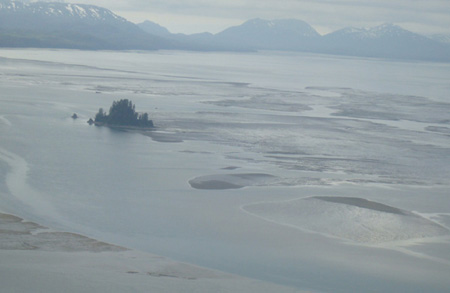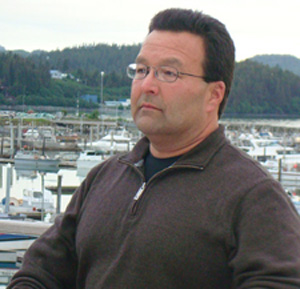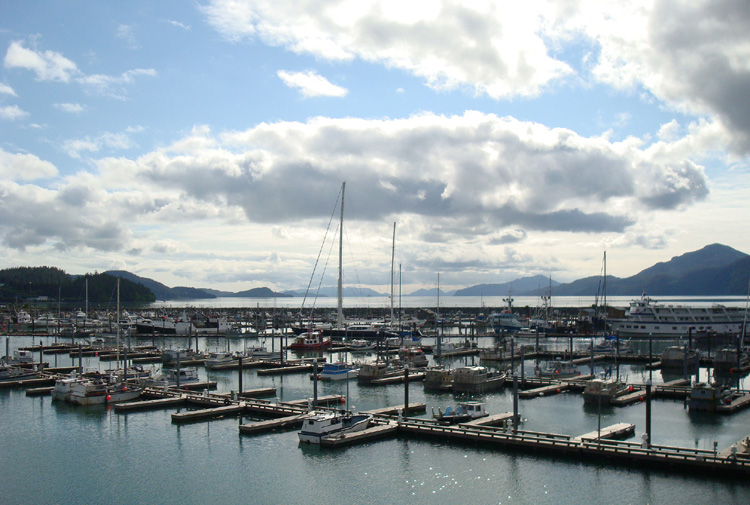Fishing For Celebrated Copper River Salmon
CORDOVA, Alaska – In this misty, mountain-flanked town, there are no traffic lights, there is no movie theater, and there is only one produce delivery by plane a week for the handful of restaurants, where a vegetarian omelet is, understandably, “a mix of what we have left at the time.”
There are no roads in or out. The only way to get here is by boat or plane. And in the summer, when the sun shines brightly, you’ll need the Ray-Bans 24-7, as it never sets.
This is Cordova, population 2,000 – on a good day, as one local joked. It’s a place where the high school graduating class is all of 40 students; and the liquor store, which has an espresso bar in it, is owned by the same woman who operates the Bible store next door. This small fishing village sits in South Central Alaska on the Orca Inlet in Prince William Sound. And it is renowned as the home of the famed Copper River salmon, and to some of the hardest working fishermen around.
That’s why I am here after three plane rides and nearly 10 hours of traveling from San Jose last week. Along with a couple of other food writers and chefs from around the country, I was invited by the Copper River/Prince William Sound Marketing Association (funded by the local fishermen) to get a first-hand look at the fishing industry here.

Salmon is revered in these parts. Indeed, Alaska is the only state in the nation in which salmon is protected in the state constitution.Â
Four canneries operate here, cleaning, gutting, smoking and flash-freezing fresh salmon to be shipped all over the world. Everyone you meet here is or was, or is related to a fisherman. Surprisingly, a good number who fish are in their 20s — sons and daughters of fishermen who followed their parents and grand-parents into this difficult line of work.
Each year, about 500 licensed commercial boats fish for Chinook, Coho, Sockeye and other salmon varieties that migrate up river from saltwater to the Gulf of Alaska to spawn in streams feeding the Copper River. Looking like the foam skimmed off the top of a mug of cocoa, the Copper River is one of the siltiest on Earth. It deposits 214 billion pounds of silt annually.

Fishermen catch the salmon after the fish have fattened up, but before they make the arduous upriver swim. That’s what makes Copper River salmon so prized – its rich, velvety, super lush flesh. It is the way salmon should taste.Â
In Cordova, life operates around the fish. Summer brings a salmon run marathon, a salmon music festival, a salmon shadow-puppet show, and of course, a salmon cook-off.
Fishermen gather in the mornings at the funky Coho Cafe on Main Street. Like a place right out of Anthony Bourdain’s “No Reservations” show, you wind your way through an unmarked door, down a narrow corridor, then another, until you reach an old diner tucked away in the back of the building. Cigarette smoke fills the air, and cracked vinyl chairs and charming mismatched coffee cups make up the decor du jour in this speakeasy-like destination that serves legendary sourdough pancakes.
Fortified by a huge breakfast, the fishermen head out _ if the run is open. State agencies closely monitor how many salmon make it back to the spawning areas. If there aren’t enough, fishing is closed down until the numbers are in line.Â
Unfortunately, this has been a disappointing season, fishermen say. Last year’s commercial fishing harvest was a record 2 million salmon. And most years, it’s at least 1 million. This year, the forecast is for 890,000.Â
Mother Nature may be to blame. Water levels have been low in this town that usually gets 167 inches of rain annually. Low water means oxygen depletion for fish. Low water also means there may not have been enough snow in the winter to insulate and protect adult salmon and their offspring from the cold.
Even so, fishing here can be a lucrative business. Just the other day, six boats pulled up to one cannery, depositing a total catch of 285,000 pounds. For Sockeye, the going-rate to fishermen is $1.25 a pound. Do the math, and you come up with a fairly princely sum.

Still, this year, some fishermen have kept their boats tied up, rather than venture out to sea, says Bill Webber, 51, vice president of the Copper River/Prince William Sound Marketing Association, and a fisherman since he was 7 years old.
Rising fuel costs are the main factor, he says. Diesel was about $3.30 a gallon last year; this year, it’s about $5.70 a gallon. For Webber, a round-trip excursion on his fishing boat means $900 in fuel costs alone.
There is also the un-talked-about danger. Fishing is one of the most perilous occupations around. At the South Harbor here, a statue of a defiant fisherman towers above more than a dozen bronze plaques memorializing those who have perished at sea. The spaces left empty for now are a somber reminder that almost every season at least one fisherman doesn’t make it back home. In a town where everyone knows everyone, there’s no more palpable loss.

I came to Cordova eager to learn about how wild salmon is managed for sustainability in Alaska, especially in the face of this year’s unprecedented ban on wild salmon fishing in California and Oregon waters because there are just too few fish there.
I left with greater knowledge, plus a new-found respect for this small Alaskan fishing village where salmon truly is king. I’ll never sit down to a dish of Copper River salmon again without feeling a deep appreciation for all it took to get it on the plate.
(Read Part 2 tomorrow.)


Wow Food Gal, that looks like a really fascinating trip. And I love all the scenes of the calm silver like water. Is the water really so picturesque? Are you riding along on the salmon boats in the early morning? OK, so it doesn’t sound like they have a lot of entertainment, but the big question is do they have wi-fi? 😉
Hah! Well, you have to be pretty patient with the Wi-Fi in these parts. One of my fellow food writers on the trip tried to send one email from the sole Internet cafe in town. It took her an hour!
But there’s something to be said for a slower pace. It’s kind of nice not to be plugged in and dialed in all the time. With more than half of our group of eight unable to use cell phones (no service), we did something we don’t do nearly enough of these days: We spent time talking to each other face-to-face. Most of us had never met each other before landing in Cordova. By the end of the trip, we parted as great friends who promised to stay in touch. (OK, with all of us scattered across the country now, we might have to resort to email and cell phones to do THAT.)
I just discovered your new identity, Carolyn, after learning of your departure from the Merc — their huge loss. The time previously spent in on-line food & wine sections was diverted during the Hilary-Barack period and only just let up while the Democratic nominee is testing international waters.
To be honest, I forgot just how well you write — apart from the excellence of your reportorial skills — this story whacked me upside my head and reminded me. I have such a yen for salmon at this moment!
Thanks for not giving up your writing. Despite all that’s going on in the world these days, I’ll definitely return to touch bases with your chronicles … I’m so glad you’re alive and writing as well as ever!
Wotten! Welcome back! 😉
Good to hear from you, and glad you found my new blog. Thank you for all the kind wishes. I WILL keep writing, believe me. I don’t think I could stop if I wanted to. It’s kind of like how I can’t give up chocolate, either.